As an Amazon Associate, we earn from qualifying purchases. We may also earn commissions if you purchase products from other retailers after clicking on a link from our site.
Nobody likes having their travel plans disrupted, but sometimes, the weather can cause delays beyond anyone’s control. So, does rain delay flights?
Generally speaking, rain alone doesn’t delay flights. However, severe weather conditions, such as thunderstorms, high winds, or low visibility, can cause flights to be delayed or even canceled. In such instances, air traffic control limits the number of planes in the air for safety reasons.
This post will discuss how different weather conditions affect flights and how airlines deal with weather-related delays. Read on for insights into your options if your flight is delayed due to bad weather.
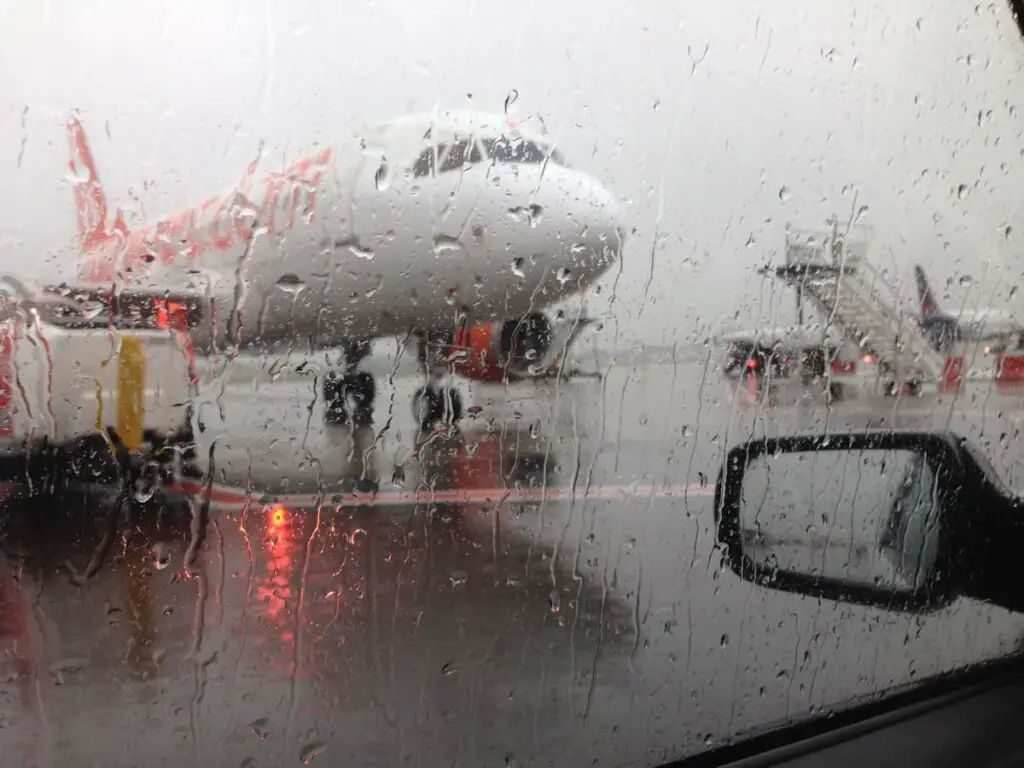
What Kinds of Weather Will Delay a Flight?
Contrary to popular belief, rain rarely delays flights. In fact, most commercial jets are designed to take off and land in the rain.
However, severe weather conditions like thunderstorms, lightning, hail, high winds, and snow can delay or cancel flights. These types of weather can pose a danger to both passengers and crew members, and they can also disrupt airport operations.
Here’s a rundown of how different severe weather conditions affect flights:
Freezing Rain Can Cause Ice Buildup
As its name suggests, freezing rain is precipitation that falls as ice pellets. In the United States, there are typically only two freezing rain events yearly. However, even a short period of freezing rain can cause significant disruption.
Freezing rain can coat aircraft with a layer of ice, compromising the plane’s performance. Ice buildup on wings and other parts of the plane can change its aerodynamics and potentially lead to dangerous situations during takeoff or landing. As a result, airlines may delay flights until de-icing operations are completed.
Besides, if the rain is freezing on the ground, it can create slippery runways and taxiways, making it unsafe for planes to take off or land.
Thunderstorms Cause Turbulence
Thunderstorms are one of the most dangerous weather conditions for flying. These conditions create severe hazards for airplanes, including strong turbulence and reduced visibility.
Turbulence results from the updrafts and downdrafts within a thunderstorm, which can toss an aircraft around in the sky. That can be dangerous for both passengers and crew, and it can also damage the plane itself.
As the National Weather Service reports, reduced visibility is another common problem during thunderstorms, as heavy rain and hail can obscure the view from the cockpit. That makes it difficult to navigate, increasing the risk of a crash. For these reasons, airlines will often delay flights when thunderstorms occur.
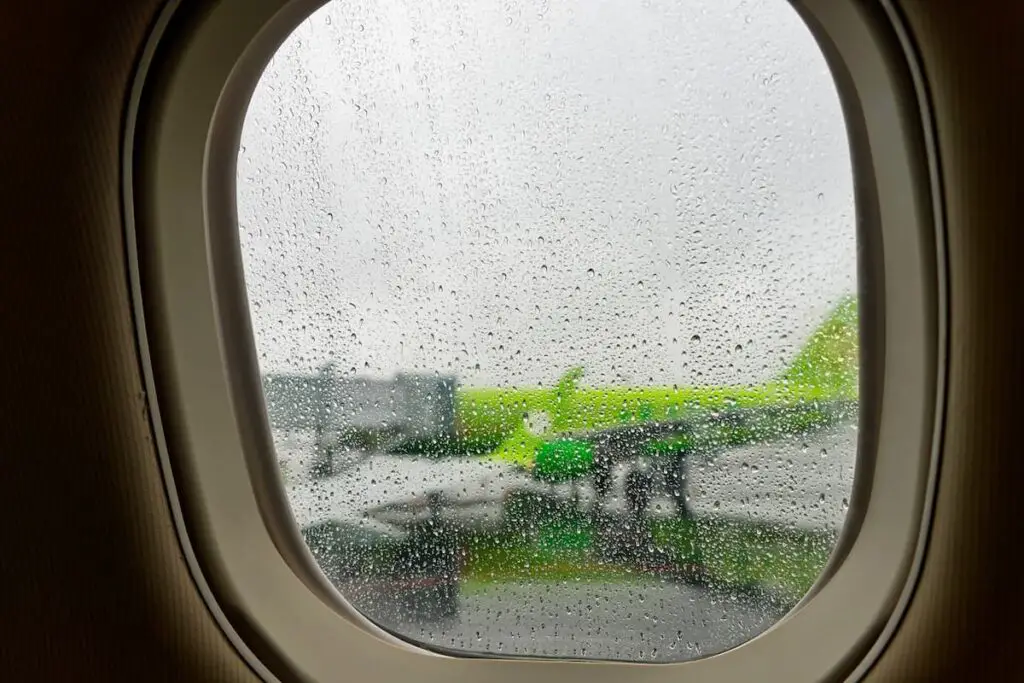
Note: Modern aircraft are equipped with sophisticated radar systems that allow them to detect and avoid thunderstorms altogether. Nonetheless, airlines will still delay flights during thunderstorms to ensure the safety of passengers and crew.
High Winds Can Disrupt Takeoff and Landing
Strong winds can also pose a danger to aircraft, affecting their ability to take off and land safely. Crosswinds, in particular, can make it difficult for the pilot to control the airplane while on the runway or during landing. That can pose a risk of the plane veering off course or even skidding during takeoff and landing.
As such, airlines will often delay flights when high winds are predicted at the departure or arrival airport. That’s especially true for smaller regional planes, which may not be able to handle strong winds, as well as larger commercial aircraft.
Heavy Snow and Ice Can Disrupt Operations
Heavy snow and icy conditions can also affect flights, as they can disrupt airport operations. Specifically, snow and ice can make runways slippery and dangerous, causing delays in takeoff and landing.
An airplane stuck on the ground during a snowstorm can lead to delays or cancellations as airports work to clear runways and de-ice aircraft. In extreme cases, airports may even close entirely due to heavy snowfall.
Low Visibility Can Disrupt Airport Operations
Visibility is another crucial factor for airplanes to take off and land safely. Dense fog, heavy rain, and low clouds can lead to delays or cancellations.
Low visibility can disrupt airport operations by making it difficult for air traffic controllers to safely direct aircraft in the sky. In some cases, airports may temporarily close until visibility improves.
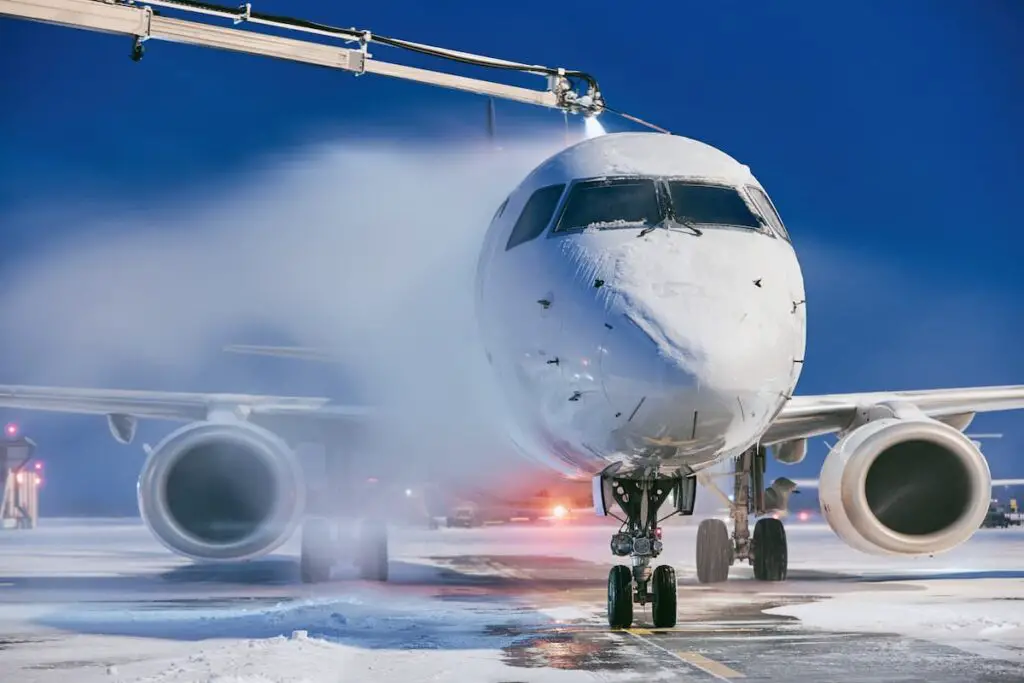
How Airlines Handle Weather-Related Delays
In general, airlines and airports will do everything they can to avoid delaying or canceling flights. However, safety is always the top priority — so if there’s any doubt about whether it’s safe to take off or land in certain conditions, the airline will err on the side of caution. That said, airlines typically have contingency plans for dealing with bad weather.
Here are a few steps airlines may take during weather-related delays:
Delaying or Canceling Outbound Flights
As I’ve just pointed out, extreme weather conditions can make flying dangerous and uncomfortable, so it’s not surprising that airlines often take steps to avoid severe weather when possible. That may involve canceling or delaying flights scheduled to depart from an airport forecast to be affected by bad weather.
While delays and cancelations can be frustrating for passengers, they’re usually done in the interest of safety. Therefore, it’s essential to be prepared for the possibility of a delay or cancelation due to bad weather.
Rerouting Incoming Flights To Avoid Bad Weather
Airlines may also reroute incoming flights to avoid bad weather — especially if the original destination airport is forecast to have severe conditions. That can involve diverting flights to nearby airports that are not affected by the weather.
Once the weather clears, the airline will work to get passengers to their original destination, either via another flight or ground transportation. While diversions are expensive and time-consuming for airlines, they’re typically done in the interest of safety.
Providing Accommodation for Delayed Passengers
Airlines may provide accommodations for affected passengers, such as hotel rooms or meals, if weather-related delays occur. Of course, the level of accommodation will depend on the specific situation and airline policies.
For instance, a short delay may not result in accommodations, while a longer delay or cancelation due to bad weather may warrant more assistance from the airline. In addition, airlines may offer flexibility for rebooking flights for passengers unable to continue their trip due to a delay or cancelation.
Suspending Operations at Affected Airports
In extreme cases, airlines may temporarily suspend operations at airports experiencing severe weather. That can involve canceling all flights in and out of the airport until conditions improve.
Again, safety is the top priority — so suspending operations at an airport can be necessary if the weather is too severe for safe flight operations.
How To Prepare for Potential Weather Delays
While there’s no way to guarantee that your flight won’t be affected by bad weather, you can take steps to prepare for the possibility of a delay or cancelation.
Here are a few tips for dealing with weather-related delays:
Check the Weather Forecast Before Your Trip
Before booking your flight, it’s a good idea to check the weather forecast for your departure and arrival airports. That way, you can avoid flights that are likely to be affected by bad weather. Additionally, checking the forecast before your trip can help you plan for possible delays or cancelations.
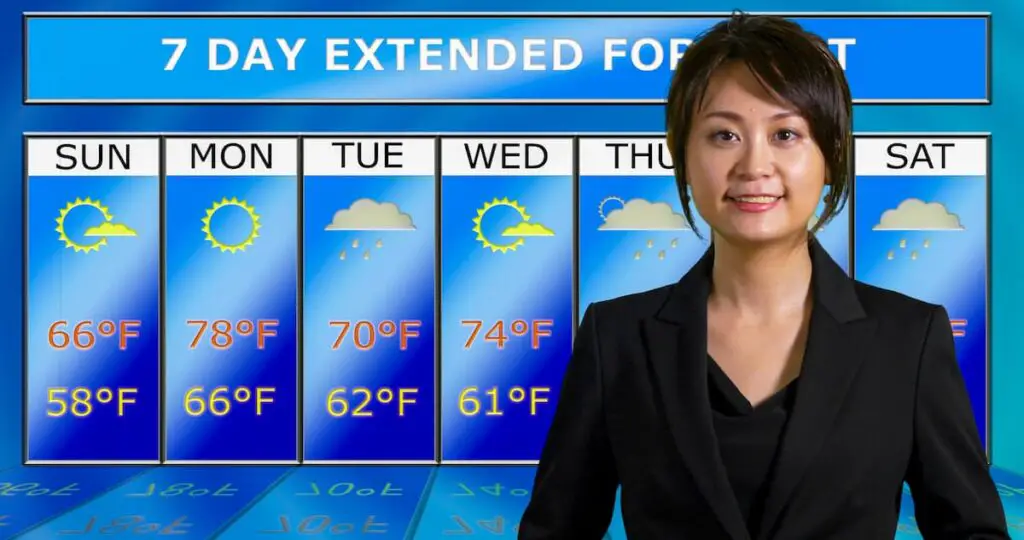
Here are a few resources for checking the weather forecast at specific airports:
- The National Weather Service’s Aviation Weather Center
- The Federal Aviation Administration’s (FAA) website
- Your airline’s website or app
You can also use weather apps with alerts that notify you of weather conditions in your selected locations. Read my guide for a complete list of these apps to stay on top of weather forecasts. [Best Weather App with Alerts]
Familiarize Yourself With Your Airline’s Policies
It’s also a good idea to familiarize yourself with your airline’s policies for weather-related delays and cancellations so that you know what to expect in the event of a delay or cancelation.
For instance, some airlines may offer more flexibility for rebooking flights or provide accommodations in the event of a weather-related delay. Knowing your airline’s policies can also help you plan ahead and make decisions about your trip, such as booking a flight with a different airline if their policies are more favorable for weather-related delays.
Pack Necessities and Plan Ahead
In case of a delay or cancelation, it’s vital to have essential items with you, such as medication, phone chargers, and any necessary documents. It’s also helpful to have a plan in case your flight is affected by bad weather, such as having the contact information for your hotel or rental car company on hand.
Consider Trip Protection or Travel Insurance
Consider purchasing trip protection or travel insurance if you’re concerned about potential weather-related delays and cancelations. That can provide coverage for expenses related to a delay or cancelation, such as accommodations and rebooking fees.
Besides, having a backup plan can help alleviate stress in the event of a weather-related delay or cancelation. However, it’s essential to remember that trip protection or travel insurance doesn’t cover all delays and cancelations, so it’s always a good idea to check the fine print before purchasing coverage.
Here’s an excellent video that may come in handy if you need tips on dealing with flight delays:
Do You Get Compensation if Your Flight Is Delayed?
You don’t get compensation in the United States if your flight is delayed. The country follows a “no compensation” policy for delayed flights, unlike some European countries that require airlines to provide compensation for flight delays.
However, the airline may offer rebooking options or assistance if your flight is canceled or significantly delayed. And in some cases, they may provide accommodations such as lodging or meals while you wait for your rescheduled flight. Therefore, it’s always best to read and understand your airline’s policies for cancelations and delays.
How Long Can a Flight Be Delayed Before Compensation?
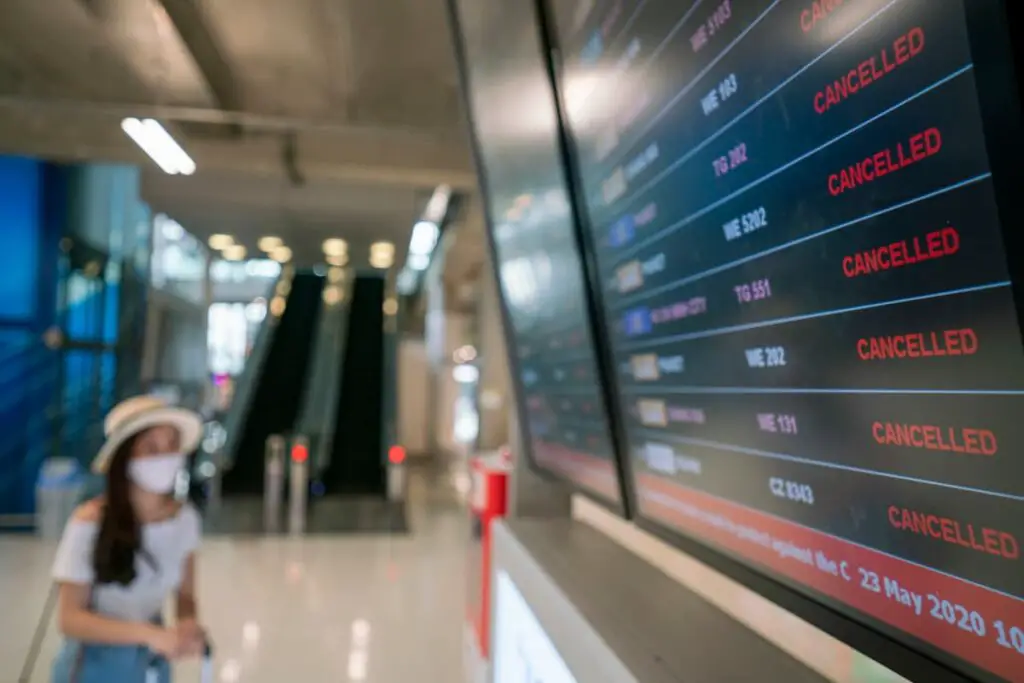
There’s no set time limit for when an airline must provide compensation for a delayed flight in the United States. However, in the EU, airlines must provide compensation for flight delays of three hours or more.
Key Takeaway: Compensation for flight delays is not guaranteed in the US, even if your delay lasts several hours or more.
How Do I Complain About an Airline?
If you have a complaint about an airline, your first step should be to contact the airline directly and explain the issue. If the airline cannot resolve your complaint or if you’re not satisfied with their response, you can file a complaint with the Department of Transportation.
You can also file a complaint with the Better Business Bureau or seek legal assistance if necessary. It’s important to remember that airlines do not have to provide compensation for flight delays unless specified in their policies or in certain circumstances, such as international travel.
That being said, here are a few tips for filing a complaint about an airline:
- Be clear and concise about the specific issue or problem, including any applicable flight information or dates. That way, the airline or agency handling your complaint will have all the information required to address the issue.
- Keep records of any correspondence with the airline, such as emails or phone calls. That can help provide evidence for your case.
- Be prepared to provide a proposed solution. While airlines may not always be able to provide compensation for flight delays, they may offer alternatives such as rebooking options or travel vouchers.
- If necessary, follow up with the airline or appropriate agency to ensure your complaint is adequately addressed. It’s important to advocate for yourself and ensure that your concerns are heard.
- Understand your rights as a consumer and the airline’s policies. That can help you determine the best course of action for addressing your complaint.
- Consider seeking legal assistance if necessary. In some cases, a lawyer may be able to provide advice or representation for your complaint.
Conclusion
While rain rarely delays flights, other types of severe weather can. It’s essential to stay informed about the weather and familiarize yourself with your airline’s policies in case your flight is affected by bad weather. And don’t forget to pack essentials and have a backup plan in case of a delay or cancelation.
With some preparation and flexibility, you can navigate potential weather-related delays and still have a successful trip. Just remember: safety always comes first!
